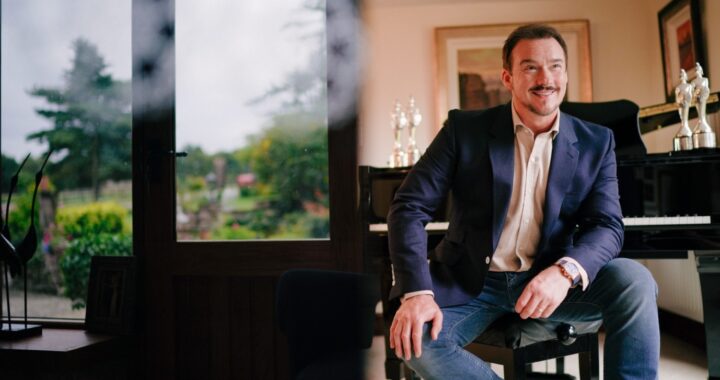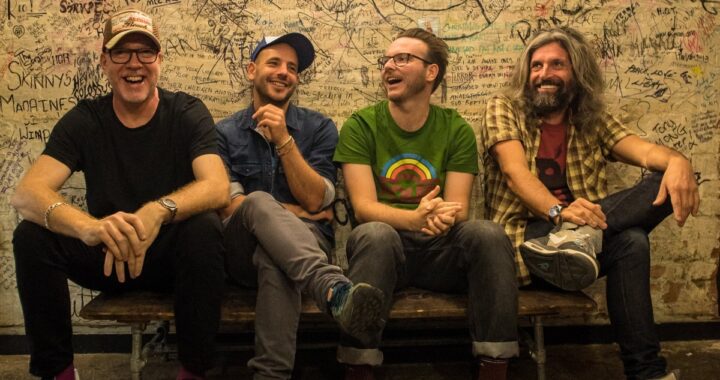Interview: Martin Courtney
6 min read
Given that he is partially responsible for the dreamy sounds of Real Estate and wholly responsible for the beautiful, jangly strains of Many Moons, his first solo record, it’s perhaps unsurprising that Martin Courtney comes across as a singularly laid back guy. Very little phases the man, clearly, and his unpretentious attitude to work, love and music feels strikingly like a life philosophy.
 Fans of Courtney’s work with Real Estate – particularly that band’s stunning 2014 record Altas – will have a good idea of what to expect from Many Moons. But that’s not to imply the new album sees Courtney going over old territory; indeed there is something strikingly forward thinking about the release, despite the debt it pays to folk and soul of the 70’s. It’s unashamedly sweet in a way that comes to feel genuinely brave, and its upbeat tone reaches towering heights of greatness by the time the piece has run its course.
Fans of Courtney’s work with Real Estate – particularly that band’s stunning 2014 record Altas – will have a good idea of what to expect from Many Moons. But that’s not to imply the new album sees Courtney going over old territory; indeed there is something strikingly forward thinking about the release, despite the debt it pays to folk and soul of the 70’s. It’s unashamedly sweet in a way that comes to feel genuinely brave, and its upbeat tone reaches towering heights of greatness by the time the piece has run its course.
We spoke to Courtney about Many Moons, touring, and his influences.
Joseph Earp: How are you and where in the world does our interview find you today?
Martin Courtney: I’m well, thanks. Tired after a long CMJ week in NYC. I’m writing from my house in Beacon, NY.
JE: How did Many Moons come about? At what point did you realise it was going to be a solo record?
MC: I’ve known Jarvis [Taveniere, of Woods] for a few years now. Our two bands have toured together a few times, and he even recorded some of the songs on Real Estate’s first and second records. At some point we spoke about doing something musical together. We got together a few times back in early 2013 and started working on some ideas, but then I got distracted with writing and then recording Real Estate’s third album, Atlas. Jarvis and I got back together in the fall, after the Real Estate record was done, and started working on this project in earnest.
Originally, it was just going to be a single – two or three songs – but once we got started, we were stoked on how it was sounding, and I had a good amount of free time on my hands before Atlas came out, so I just kept writing. At a certain point, we realized we had like 6 or 7 songs that we were working on, so I just decided to write a few more and make it a full LP.
JE: How did you find the writing of the record? Was it harder than it has been for you in the past, or easier?
MC: It was basically the same. Some songs are easier than others. I will say that the fact that it took about a year and a half to finish this album, through sporadic recording sessions, gave me a lot of time to get these songs exactly how I wanted them. I had a good amount of time to edit structures and arrangements and lyrics. Generally in the past, even if there wasn’t like, a hard deadline for turning a record in, there was a bit more self-imposed pressure to get things done. This was just, when it’s finished, we’ll put it out. Except at the end, during the mixing process, when I realized that if we didn’t finish the thing soon, we might have to wait until next year to put it out. That was the only time we felt any kind of pressure to get it done.
[youtube id=”vvN4wroh2Wc” width=”650″ height=”360″]
JE: The album has such a lush, rich sound. Did you have that in mind for the project from the very beginning?
MC: Not exactly, at first the idea was to have these songs feel relatively clean and sparse, through clean drum and bass sounds and lots of acoustic instruments. Sort of like an old soul or 70s folk record. I think to a certain extent, we followed through with that, but I have a tendency to layer stuff up a lot, things don’t feel done to me until they’re pretty full sounding. And I suppose adding strings didn’t help. The sound we ended up with just kind of happened over the course of recording.
JE: Some have pointed to Big Star and The Kinks as touchstones for the record. Would you agree with those comparisons? Were there any other specific points of inspiration for you?
MC: Yeah, I mean I thought a good way to try and have this album not sound too much like Real Estate would be to try to incorporate some different influences, or to arrange the songs in a way that I hadn’t tried in the past. A good amount of 70s/80s pop in there. Other influences might be like, Nick Lowe, Nick Drake, The Who, Joni, Shoes…
JE: Are there plans to tour the record? And if so, will you be hitting the road alone?
MC: There will be some touring, probably early next year. I’ll have a band with me. It includes Jarvis on bass, also Aaron Neveu and Matt Kallman, who both played on the record, on drums and keys, respectively, and Doug Keith on lead guitar. We just played a bunch of shows last week during CMJ, and I must say we’re sounding pretty good! These songs have been fun to play live.
JE: After you release an album, will you ever listen to it back again? Do you listen to the self-titled Real Estate record for example?
MC: I don’t sit around listening to my own music ever. Most of the time I find it kind of excruciating to listen to: all I hear are the imperfections and things I would change if I could. I’ll sometimes listen to a song to remember how we recorded something so I can play it live, but I don’t ever listen just for the enjoyment of it. However, I do feel like enough time has passed since the first Real Estate record came out that I can listen to it and enjoy it for what it is. It doesn’t make me cringe at this point. But that doesn’t mean I’m gonna put it on in the car while I drive to the store or something.
JE: When push comes to shove, what would you say is the best song you have ever written?
MC: Like, when someone is shoving me and pushing me in an alley somewhere and they’re not going to stop unless I tell them my favorite song I’ve written? I don’t really know, that’s constantly changing. I might say right now that I like Vestiges the most, since it probably means the most to me, lyrically, at this moment. Plus, that’s probably my favorite sounding recording on the new album.
[youtube id=”hR4w3ALuA44″ width=”650″ height=”360″]
JE: At what point did you decide music was what you wanted to do with your life? Was there ever a ‘eureka’ moment?
MC: Not really. I played music in lots of bands all throughout high school and college, but never seriously thought of doing it for a living, beyond daydreaming. I don’t think I really saw a path to a “career” in music until Real Estate put out our second record on Domino. That’s when I thought maybe we could keep doing this for a while.
JE: What is the first song you ever learnt to play on guitar?
MC: I think it was altz #2 by Elliott Smith, freshman year of college, from tabs on the internet.
JE: Tell me something you’ve never told an interviewer before.
MC: The second song I learned on guitar was Long, Long, Long by the Beatles.



